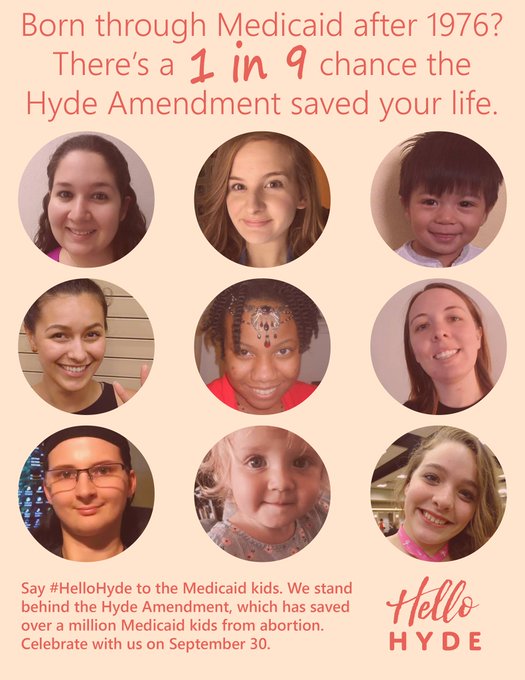Born through Medicaid? Want to support the #HelloHyde campaign? Add your photo at HelloHyde.org #prolife

For Planned Parenthood, repealing the Hyde Amendment is about profit
For Planned Parenthood, repealing the Hyde Amendment is about profit
Planned Parenthood and their allies who drafted the new Democratic Party platform this election season are on a crusade to repeal the Hyde Amendment. Thanks to Hyde, a rider which has passed every year since 1976 with bipartisan support, at least one million lives have been saved because taxpayer dollars are prevented from paying for abortions, except in limited cases.
Secular Pro-Life, which will celebrate the 40th anniversary of the amendment in September with #HelloHyde, puts a face to those lives Hyde has saved.
Not only would those lives not be here if not for the Hyde Amendment, more abortions would occur if Hyde were repealed — at least 33,000 more annually, as estimated by Planned Parenthood’s former research arm, the Guttmacher Institute.

In a September 2013 analysis, Guttmacher attempted to downplay the effects of repealing the Hyde Amendment:
Accordingly, lifting the Medicaid restrictions on abortion coverage would translate into an estimated 5% rise in the total number of abortions in the group of states in which funding is currently restricted. The national impact of repealing the Hyde amendment would be even smaller: The number of abortions among Medicaid-eligible women nationwide would be expected to increase by approximately 33,000 if the Hyde amendment were to be repealed—or only a 2.5% increase in the number of abortions performed nationwide.
“Only” 2.5%, Guttmacher writes. When you consider that the number of abortions committed nationwide hovers around a million per year, that 2.5%, however, does not seem quite so small. These 33,000 abortions are real human beings whose lives will be ended.
Planned Parenthood is the nation’s leading abortion chain, committing a third of all abortions — 323,999 in 2014-15 alone — annually. Planned Parenthood and its allies have touted their facilities as health care locations for low-income women. If Hyde were repealed, Planned Parenthood would certainly see more low-income women for abortions, decreasing the numbers of their future generations.
(One tragic irony is that while aborting the future generations of those with low income, the very politically involved Planned Parenthood claims to be a champion for low-income and disenfranchised voters.)
Planned Parenthood has proven itself time and time again to be more interested in profit than in women. Planned Parenthood’s own figures show that they take in over $500 million annually from taxpayers; yet taxpayer dollars increased, the abortion chain provided fewer legitimate health care services, which were already on a steady decline in their facilities.
If this trend continues, Planned Parenthood’s tax dollars will continue to increase (along with abortions) while their actual health care services will continue to decrease.
Planned Parenthood’s call to repeal Hyde suddenly makes more sense as the nation’s largest abortion chain exposes its abortion-first business model.
Data from the nation’s abortion giant show their focus isn’t on health care, it’s on abortion. Repealing the Hyde Amendment would help Planned Parenthood to further that agenda.
Live Action News is pro-life news and commentary from a pro-life perspective.
Our work is possible because of our donors. Please consider giving to further our work of changing hearts and minds on issues of life and human dignity.
Contact editor@liveaction.org for questions, corrections, or if you are seeking permission to reprint any Live Action News content.
Guest Articles: To submit a guest article to Live Action News, email editor@liveaction.org with an attached Word document of 800-1000 words. Please also attach any photos relevant to your submission if applicable. If your submission is accepted for publication, you will be notified within three weeks. Guest articles are not compensated (see our Open License Agreement). Thank you for your interest in Live Action News!
Read Next

Oregon Democrats reject pro-life amendments to abortion provider shield bill
Oregon Right to Life
·More In Opinion

Guest Column
Why we can't ignore the growing threat of well-funded abortion training programs
Michael Seibel
·
Politics
Trump administration touts pro-life policies while pro-lifers hope for greater action
Nancy Flanders
·
Opinion
Research shows Catholic support for IVF declines once Church teaching is understood
Angeline Tan
·
Issues
Why more regulation won't solve the ethical IVF crisis
Angeline Tan
·
Guest Column
GUEST OPINION: Why I believe life is always worth saying 'yes' to
Emily Berning
·More From Rebecca Downs

Fact Checks
Debunking three myths about third-trimester abortions
Rebecca Downs
·
Newsbreak
Abortionist who caused woman’s abortion death could be released in under a year
Rebecca Downs
·
Newsbreak
Supreme Court tosses ruling that forced government to provide abortions for illegal immigrants
Rebecca Downs
·
Newsbreak
FBI investigates abortionist who reportedly twisted necks of infants who survived abortions
Rebecca Downs
·
Newsbreak
Lila Rose discusses future of Planned Parenthood funding on Tucker Carlson
Rebecca Downs
·